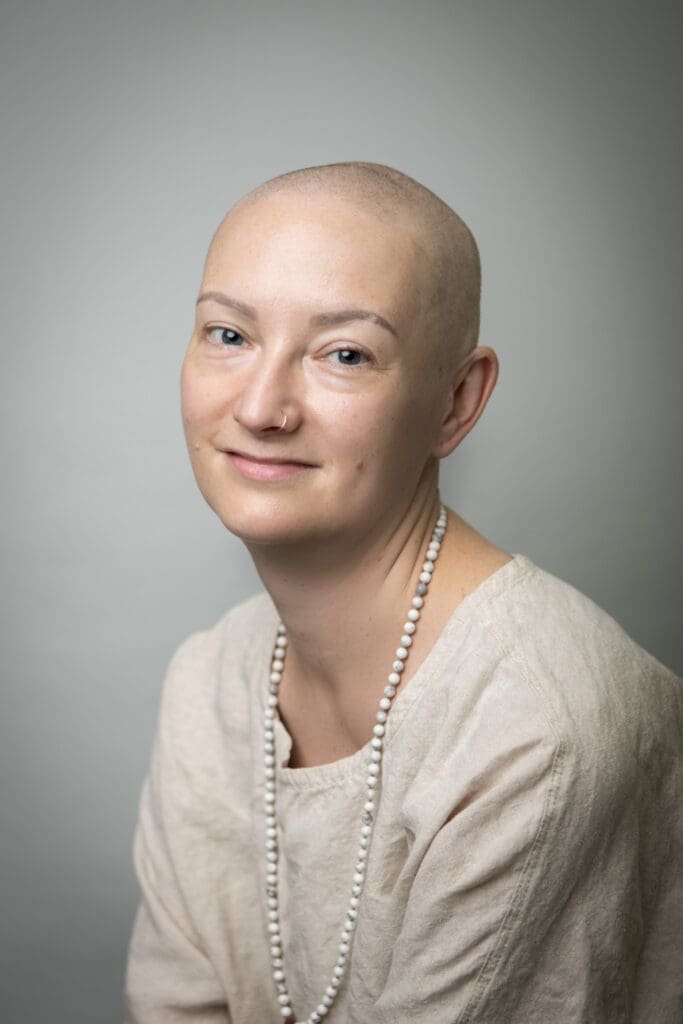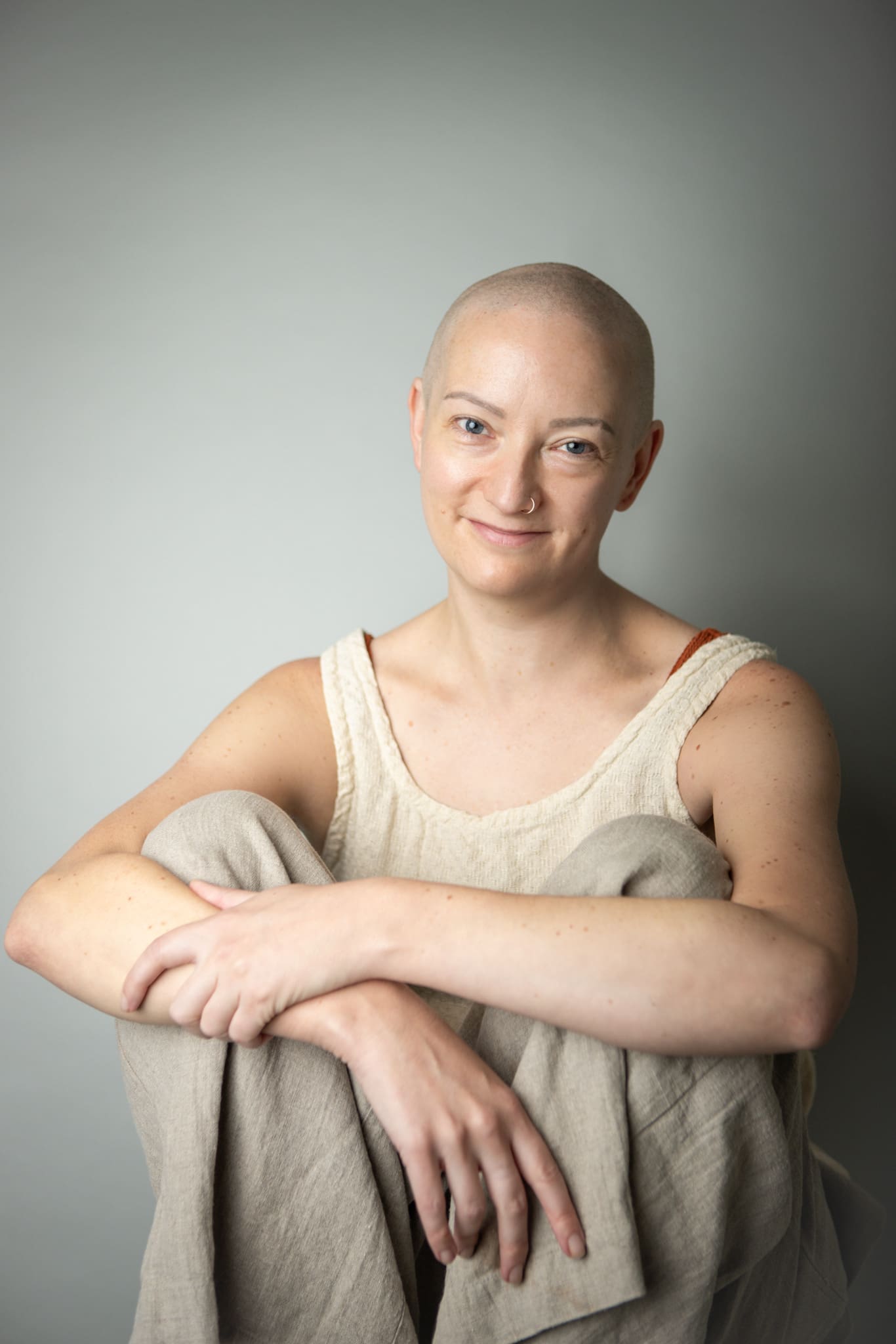No longer an “old man’s disease,” we asked three brave, young, beautiful women about their cancer journeys. —Noa Nichol



Kama Money
Heavy periods, severe cramps, extreme fatigue; with all the stress of the pandemic, splitting from her partner, adjusting to being a single mom and moving from White Rock, B.C., back to her hometown of Port Alberni on Vancouver Island, Kama Money, a teacher, didn’t give much weight to her symptoms. Neither did her doctors, until, in summer 2021, her pain increased and an emergency trip to the hospital resulted in a fast-tracked hysterectomy—and a completely unexpected outcome.
“I woke up from surgery and they’d removed a seven-inch section of my colon due to very serious metastatic stage 4 cancer,” she says. “I wasn’t in a good place to receive that news; all I needed in that moment was an Ativan and a warm blanket.”
A Dylan Thomas line also, eventually, came to mind: “Rage, rage against the dying of the light,” Money recalls. “I thought, I have to be there for my son. So, despite the data showing there’s only a 15 per cent likelihood of me making it five years, I’ve decided to fight my best fight.”
Besides, she says, the stats are old, and largely based on a different sort of patient—when it comes to colon cancer, it’s been painted as an old person’s disease. But more and more young women, like Money, are getting the disease, and experts have yet to figure out why.
Money has her own theories. “Is it the stuff in our food, the ingredients in our skincare, the toxins in our cleaning products?” she wonders. “Is it stress? Grief? Keeping our emotions in, rather than letting them out? I’m not qualified to call these things causations, but what’s the correlation?”
In addition to her doctors’ recommended treatment, which includes chemotherapy, Money has spent a lot of time and effort (not to mention, finances) changing her lifestyle and exploring naturopathic modalities. Beyond juicing, cutting out processed sugar and alcohol and “eating all the salad,” she’s also invested in mistletoe and IV therapy, engaged in reiki and sound bath sessions and, through InspireHealth, spoken with a counsellor.
She’s also become part of an incredible community: the cancer community. “It’s a club you don’t really want to join,” she laughs, “but the people in it are so positive and supportive. We swap ideas and recipes, we cheer each other on. And if we find another people dealing with cancer, we bring them in wholeheartedly.”
Though she still wakes up each day thinking, is this really true, she recognizes that cancer has, in some ways, changed her life for the better. “That sounds crazy to say, but I feel a lot lighter. I feel like I have this purpose, to fight and beat this thing, even though, yes, it’s absolutely scary as hell.” Gofund.me/36aeff8c
Daniella Allen
A year or so ago, freelance curve model Daniella Allen was a happy, healthy 27-year-old. When she started feeling under the weather, she didn’t make much of it—until the bug lingered a bit too long.
With no family physician, Allen paid a visit to a walk-in clinic; the doctor on duty told her there was nothing to worry about. Then, “out of nowhere,” large bruises began to bloom on her body. She had a scratchy throat; felt too sick to work out. She went back to the same walk-in doc—and continued to do so week after week; he said she was “young and healthy” and put her on various antibiotics and a puffer.
“I was doing everything I possibly could to not stay sick,” Allen recalls. “I took cold and flu meds, probiotics, vitamins up the wazoo. Nothing worked. And all the while, as a young adult, I was trying to figure out why, even when asking to get bloodwork done, I was being pushed to the side. It’s like the system assumed that, since I was young, I was healthy, and therefore I didn’t really need much else.”
The system could not have been more wrong. When she woke up one morning feeling like she couldn’t breathe, her sister drove her to the hospital where they took blood and did a chest X-ray. The tests seemed to show severe pneumonia, so she was kept overnight. “It was awesome, strange as it sounds, to hear some sort of diagnosis,” Allen remembers.
However, an hour or two later, a hospital staff member returned, needing to take more blood. The next day, a doctor came to her bedside and asked if there was any history of cancer in her family; he finally revealed they’d found some abnormalities in Allen’s blood. After more testing, a verdict: acute myeloid leukemia, a.k.a. blood cancer.
“It was complete and total shock, just utter disbelief,” she says. “It was literally a snap of the fingers: from normalcy to cancer.”
Treatment for Allen began immediately, including month-long chemotherapy at Vancouver General Hospital and, eventually, a bone marrow transplant (thanks to a donor she’s lovingly nicknamed Dennis). Though she says she “didn’t get to stop and think about it … I had to go directly into it,” one question did cross her mind: when she came out of this on the other side, would she still be able to have children?
“No one ever posed that question to me, although I obviously was a young, childless woman,” she says. “I had to plan and work through that on my own.”
After a second bone marrow biopsy, Allen was in remission. Two rounds of chemo past that, she underwent an egg retrieval, to up her chances of one day starting her own family. “If you’re older or past menopause and you get cancer, that’s not something you think about,” she says. “But I’m in my 20s, and it is. The frustrating part is, I had to advocate for myself on that matter, and make it happen on my own. I think that’s part of the stigma around leukemia being a child or an older person’s disease that really needs to change.”
With a lack of resources for her demographic within the health system, Allen found a community—and information— online. “Social media gave me the opportunity to meet people my age going through what I’m going through,” she says. “Even if we have different strains, we can relate on so many issues, like fertility, sex, intimacy, losing so much of yourself, losing your hair. But I had to go out there and find it myself.”
Again, she says, the perception around who cancer impacts needs to change. “Everything, from the financial burden to fertility issues to the fact that very few of us have a family doctor … those are issues that hit differently when you’re 20, 30, 40,” Allen says, adding that, while she is incredibly grateful to all the nurses and medical professionals who have helped her during her journey, it was difficult to be sick and have to advocate for herself.
“I’m coming out on top, though,” she says with a smile, adding that she’s already received invitations to return to modelling and “can’t wait to rock this bald head! Cancer is going to be with me for the rest of my life, but it’s not going to define me.” Gofund.me/309b483a
Fiona Forbes
Six months or so before the pandemic hit, Fiona Forbes started receiving notices that she was overdue for a mammogram. “I was on a scheduled yearly mammogram because I’d had a minor cancer scare 20 years earlier,” she recalls. “I got cocky, thinking lightning wouldn’t strike twice, so I just ignored the letters.”
That, she admits, was a big mistake— one she’s determined not to let other women make.
“When I finally did go in, in October 2021, the technician found a tiny shadow on my mammogram,” Forbes says. “She must have been my guardian angel, because she offered to take more pictures after her other appointments. That tiny speck turned out to be 2 millimetres of breast cancer, caught early; that woman in a full hazmat suit saved my life.”
Next up was a titanium insert biopsy and, after that, Forbes was put on a wait list for surgery. Four long months of stress and worry later, she underwent the procedure and, in July of 2022, was deemed cancer free.
“I was very lucky; I had a very treatable kind of cancer that required radiation only. But there are many kinds of breast cancer, each one different. And a big part of the problem, when it comes to people getting really sick and even dying, is not going for your mammogram when you are supposed to. I really feel I’m here today to spread the word: don’t be like me and don’t put off your mammogram. Get checked when you’re supposed to get checked. It could save your life.”
Later this month, Forbes will host the Canadian Cancer Society’s 28th annual Daffodil Ball, which raises funds for critical cancer research and support program. “Giving back to cancer as much as I can is a priority for me,” she says, adding how grateful she is for the care she received during her cancer journey. “With great advances in medical treatments the new motto really is that we want people living with cancer, not dying from it. I am walking, talking proof of that.” Daffodilballbc.ca

Be the first to comment